Fiction
Nonfiction
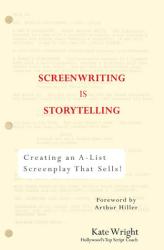
“Screenwriting is Storytelling” written by Kate Wright, forwarded by Arthur Hiller, is a diverse, and engaging introduction to screenwriting with many lessons in plot and character development. Evaluating dozens of popular movies and providing insight into the art of creating a story, Wright gages screenwriting past simply making a scene eligible to an actor or director and expands the concept to the very origin of a script, the story. From this, Wright not only guides the reader through the process of making a handsome script, she as well includes the detailed aspects that create a subtle, yet concise, deeper meaning of a story.
The almost rigid, scrupulous manner Wright orders a story into, can be a well-fit reference book for those who have no issue abiding by a stricter structure, but can also be a downside for those who prefer a more Dan Harmon approach—following a simple guideline—with room for some wiggles.
Either way, the information Wright provides is undeniably useful. I’ve found a deeper appreciation for film/story genres that—frankly—I’ve never been much a fan of, and it’s through the arduous journey of creating a script from the ground-up, that a story can be truly appreciated, which Kate Wright does a fantastic job at being the tour guide.
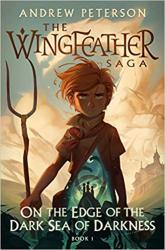
I first discovered this book in fifth grade, when my teacher read this amazing book to us. She had told us that it had songs and poems in it, and that she would sing to us, provided that we chose it for our read aloud book. Needless to say, we all wanted to hear our teacher sing. And we were introduced to the wonderful world of Aerwiar and its amazing creatures and characters, which include fearsome Toothy Cows and a crazy man called Peet. Reading it again as a teenager, I enjoyed it immensely for the second time, because of the suspense, humor, and creativity inside.
Ordinary siblings Janner, Tink, and Leeli Igby have lived in Skree, in the small town of Glipwood all their lives. Nine years ago, a Nameless Evil (called Gnag the Nameless), along with the despicable, lizard-like Fangs of Dang, took over both the Shining Isle of Anneria and Skree and now rule it with cruelty and oppression. But there is a secret in little Glipwood. A secret more dangerous than even the Fangs themselves.
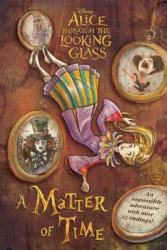
Alice has traveled back to Wonderland! She and the other characters must find what has made the Hatter go inexplicably mad, or in his case, sane. And there is another mystery afoot. A mystery that had started before Alice came to Wonderland in the first place. Your actions and decisions affect the story, as you can choose to be Alice, the Mad Hatter, the Red Queen, or the White Queen, at different times in the story, including future and past...
A choose your own adventure, this book is entertaining for a light read. I enjoyed the different perspectives and whimsical ideas, but as I was reading through to the last ending, I found myself a little bored. I suppose this is because parts of story between the four characters were exactly the same, but told as "Alice said," instead of "I said," for example. I also think that it would have been more interesting if the book had differing interpretations of the same ideas depending on the character being played. However, I did enjoy making decisions for the first characters I chose, because the story was new to me, and I couldn’t predict what I needed to do. But after the first two, I could tell exactly what decisions would lead me to the right places, because the first characters had already finished the story based on the other two's actions.
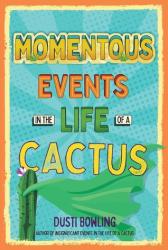
I enjoyed this book a lot.
Aven has done many things that could be hard for most people, like keeping a tarantula, learning guitar, and horseback riding. But perhaps the most impressive part of Aven's accomplishments is the fact that she did it all in the absence of arms, which she had been born without. This book is the sequel to Insignificant Events in the Life of a Cactus, which is just as good, following the adventures of Aven as well. In her first months of high school, she experiences bullies, fake friends, real friends, lies, truths, and many difficult choices. And she lives to tell the tale of many Momentous Events in the Life of a Cactus.
I liked Aven's perseverance and her refusal to let anyone destroy her happiness. She is very caring, and she likes to help out, but she also has a great sense of humor. I also liked the way the author described how the characters were feeling without an outright statement.
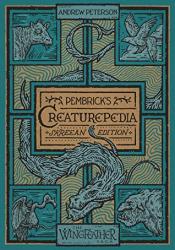
This book is delightful, despite being only 122 pages (including the author's note, which I also enjoyed immensely). It is presented as a dictionary of quirky, imaginary creatures found in the Wingfeather Saga, which is also by Andrew Peterson. It's filled with elaborate drawings of such creatures, which I deeply enjoyed looking at. The descriptions consist of short stories of "Ollister B. Pembrick"'s encounters with the animals, and his opinions on their demeanor, weaknesses, and even taste. It is very fun to read and I would recommend this to anyone looking for something to cure their boredom. I also enjoyed the made up words in this book such as "quickitude" and "dogths" (a unit of measurement involving dogs). This is an excellent, strange little book that is definitely worth opening.
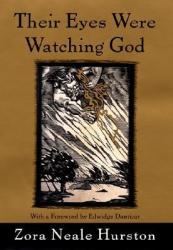
Their Eyes Were Watching God, written by Zora Neale Hurstson, is a contemporary fiction novel regarding the tale of Janie Crawford and her quest to find love. I like how the book introduces the characters in the beginning, after Janie's journey to find love, and then Janie tells her best friend about how she ended up where she was. Originally, her grandmother wed her to a man she was uninterested in. In fact, she was so uninterested in her husband that she ran off with another, more exciting man. The more she stayed with the exciting man, named Joe Starks, (she eventually married him), the more he hurt (physically/emotionally) her. Later, Joe dies, and she has little to no remorse over his death. A couple months later, she meets Tea Cake, and eventually falls in love with him. The part that I don't like about this book is that Tea Cake has a lot of warning flags, but they all seem to fly over Janie's head. I don't know if the author intended for the main character to be foolish or not, it simply shocked me how willing Janie was to devote herself to Tea Cake.
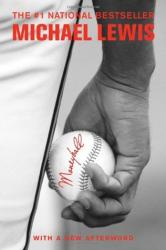
Moneyball, written by Micheal Lewis, is a narrative, nonfiction novel based on the miraculous 2002 season of the Oakland Athletics. Micheal Lewis was inspired to write about the Oakland A's because of the statistics behind the game. He realized that even though the Oakland A's had one of the lowest budgets in the MLB at the time, they were winning an unusually high number of games. What Micheal Lewis wanted to know was: why was the cost-per-win so low in comparison to other teams? Was the Oakland A's performance a fluke, or was it not?
Billy Bean, the general manager for the Oakland A's and his trusty statistician, Paul DePodesta can answer both. Billy realized that he had to look at the game differently to obtain an advantage over other teams. All the "good" players followed the money, leaving the unpicked players for the teams that could not afford the good ones. The problem was that Billy Bean could not afford the good ones. Paul DePodesta found a way to search through the seemingly useless pile of players to find stars. He realized that some player's traits, such as batting average, were overvalued in the market, while some, such as on-base percentage, were undervalued. DePodesta saw that a player, in the eyes of the market, with a low batting average was worth more than a player with a high on-base percentage. He realized that he could buy high quality players for less, and that is exactly what he did. I liked the book because it has interesting statistics in it, and it also highlights the ingenuity that went behind one of the best seasonal records in the MLB.
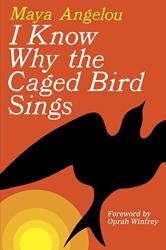
I Know Why The Caged Bird Sings, written by Maya Angelou, is an autobiographical account of Angelou's childhood. When Maya is a young child, her parents divorce. After the divorce her parents send her and her brother, Baily to Stamps, Arkansas to live with their Grandmother, where her Grandmother, affectionately referred to as "Momma", runs a convenience store. Angelou, despite her self-consciousness, appears to have had a great childhood growing up in the store. After about five years, Angelou's dad unexpectedly comes in and takes Bailey and her to their mother, who was living in St. Louis. While there, Angelou is molested by her mother's boyfriend. The boyfriend is quickly murdered and Angelou feels responsible for the death.
I liked to book because Angelou highlights how anyone can do what they set their mind to, and even in bad situations a human can grow immensely.
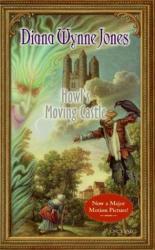
Howl's Moving Castle is yet another exceedingly charming and wonderfully hilarious fantasy masterpiece written by Diana Wynne Jones. Set in the wondrous world of Ingary, it follows Sophie Hatter in her quest to undo a curse put upon her by the Witch of the Waste that has made her into an old woman. This quest will take her to the chicken-footed castle of Howl, a haughty and capricious wizard, rumored to consume the hearts of young maids. There, she will encounter magical doors, fallen stars, anxious apprentices, and adventure beyond her wildest dreams. Although she'll have to put up with the most annoying wizard in the world to experience it.
I love this book so much because it is the epitome of good fantasy while also spending about half the time blatantly making fun of the entire genre of fantasy. It's good fantasy because it really highlights the best parts of fantasy. It has all the spectacular world building, the whimsical setting, the spectacularly implausible situations, and the characters who treat all of this like normal, day to day life. This stuff is amazing, and its why fantasy as a genre is amazing. But because it is such standard fantasy, it spices it up by poking fun at all the things fantasy takes for granted. For example, Sophie is the oldest of three sisters, which she knows means she won't do much with her life. A huge chunk of her character is her believing she is plain and normal, because that's how fairy tale rules work: the oldest two sisters are examples or background characters, while the youngest shines as a future princess or a powerful sorceress. And its so funny! Because its something we all know, because it happens so often, and because of course the people that live in this world know the rules by now! Another bit that shines is when the characters attempt to use seven-league boots, a classic fairy tale item that allows the user to travel seven leagues with one step. But when the characters try to travel seven leagues, one of them keep accidentally taking an extra step. Because of course they would! If you're getting shoved across seven leagues, you're off balance, so you take an extra step to balance yourself out! Also, how many of us regularly take a single step? So about 3 pages of this book is just a highly relatable sequence of this character shuttling herself back and forth over fourteen leagues, desperately trying to take just one step. And it's hilarious.
Another bit that shines about this book are the characters, and just how human they are. I've already mentioned that characters in this book are aware of trends and realistically skilled, both of which are refreshing in fantasy stories. But they're all also flawed, and flawed in actually bad ways. After reading so many books with characters flaws being things like "too loyal" or "too pretty" or "too noble", I love how this book just has characters that can sometimes be the worst. The character this shines through is the wizard, Howl. He's not annoying to the protagonist because he's "too nice" or "too charming." He's annoying because he throws tantrums and gets slime everywhere and never answers questions and avoids too much work at all costs and is needlessly dramatic and constantly oblivious and carries around a guitar to impress women. He's an amazing character because he acts exactly like a twenty-something with amazing magical powers would. I also love how this quality also affects the female characters, especially Sophie. She can be brash and stubborn and aggressive. She gets turned into a ninety year old, and she's cool with it in like twenty minutes because she realizes she doesn't need to impress anyone anymore. She literally throws acidic weed-killer at Howl because he says something just a little too stupid. This book allows its characters to say stupid things and make stupid decisions, because everyone does that sometimes so everyone in this book will do it too. The level of human understanding that went into this book is astounding.
All in all, this is one of the most fun books I've read in a long time. I would recommend this to anyone who loves relatable characters, amazing fantasy, a good mystery, and a fun read!
Reviewer Grade: 12
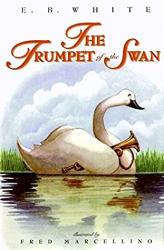
This is a childhood favorite of mine. The story follows Louis, a mute swan who travels across Canada to learn how to communicate and find his sense of self. He has to figure out how to adapt to his unique circumstances when no other swans have gone through the same thing. It is funny and unexpectedly educational about Canadian wildlife. Louis is such an entertaining and sweet character. There are occasional language choices that reflect the author's time period (vague stereotypes of Native Americans) but everything else is completely wholesome. Read this book if you have little ones or just want something lighthearted to read!
Grade 12
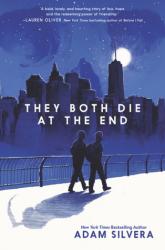
If you aren't prepared for a soul-crushingly beautiful read, don't pick up this book. In a world where everyones' death day is predicted with absolute accuracy, two teenage boys meet for one last day of life together. I admit to throwing this book across the room several times due to the intense, sorrowful nature of the story and feel that I am justified in doing so. Silvera writes a compelling love story with a melancholy twist; I feel that the plot is worth the tears that leaked from my eyes for days after finishing this book. I recommend this to anyone looking for a sob-worthy, artfully written story.
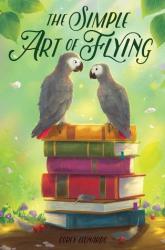
The somewhat thick juvenile book- The Simple Art of Flying- is a good read with someone who loves imagining what our pets really think. Their 'secret side'.
Alastair, the African Grey parrot, lives a dull life inside a pet shop with his bright, eager sister, Aggie. This somewhat sarcastic, yet hilarious narrator is the real reason for the book's amazingness. One boy who helps out at the shop, aspiring doctor and/or vet, Fritz, takes a shine to Aggie. He starts saving up his money to buy her. She thinks that Fritz means to buy both of them, and Alastair doesn't have the heart to tell her otherwise. A little while after Aggie is taken home with Fritz, an eccentric old woman by the name of Albertina Plopky decides to adopt Alastair, though he is very much against it. The book is mostly about his time at her home, while he devises plans on how to go and get Aggie. The book had a few plot twists that made it all the more surprising and enjoyable. One quirky habit Alastair has that adds to the plot and style of the book is: he likes to eat paper. From books, posters, or newspapers, he eats it, and somehow senses what the words are saying, and the story behind the strip. A good read for a rainy afternoon.
Reviewer's Grade: 7th
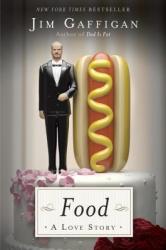
I first read this book after it was recommended to me by a teacher, and needless to say, it instantly became a favorite.
Food: A Love Story is the second hilarious memoir by comedian Jim Gaffigan about - you guessed it - food. It covers the culinary distinctions throughout geographical regions of the United States, the difficulty of eating healthy in a world of delicious junk food, the conspiracy that lead to the creation of the Chimichanga, the shame at eating at McDonalds without children, and more. This book has it all. I highly recommend this book to anyone and everyone who wants a good laugh.
Reviewer grade: 9
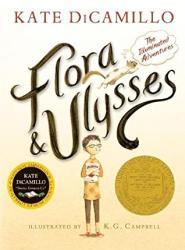
Flora & Ulysses: The Illuminated Adventures has to be one of my favorite books. Not only are every one of the characters realistic and wonderful, but the story carries a beautiful message as well.
Ulysses is a squirrel who was sucked up by a vacuum cleaner and gained superpowers. Flora is a self described, natural-born cynic. Together, who knows what they can achieve?
Flora and Ulysses' personal journeys in the novel are sweet and never fail to impress me, and I especially like some of the more minor characters like Flora's polite and hopeful father and his philosophical neighbor, Dr. Meescham, whom likes to tell stories of her childhood in Blundermeecen.
"[We were] Always opening the door in the middle of the night and finding the face of someone you wanted to see. Well, not always. Sometimes it was the face of someone you did not want to see. But always, always in Blundermeecen you opened the door because you could not stop hoping that on the other side of it would be the face of someone you loved. And maybe, too, the face of someone you did not yet know but might come to love," is my favorite Flora & Ulysses quote, courtesy of Dr. Meescham. Despite this, my favorite character has to be our protagonist, Flora. She claims that she's a cynic, yet sees the good in others. She is independent, literate, and capable, and only occasionally yells out words or phrases that she deems appropriate to the situation, such as "Treacle!", "Seal blubber," or, "This malfeasance must be stopped!".
This is a book about learning to love others and the world around you, about the power in relationships, and the meaning behind words. One of the most powerful aspects of this book is seeing Ulysses find his voice and in turn, teach others to hope.
Flora & Ulysses: The Illuminated Adventures is one of Kate DiCamillo's more lighthearted books, but it still carries a wonderful theme and memorable characters, and for this, I give it 5 stars.
Reviewer Grade 9, age 13
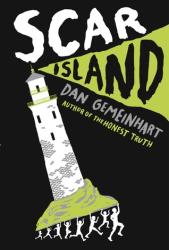
Scar Island is a children's book written by Dan Gemeinhart.
The book begins with Jonathan, our protagonist, being taken to a juvenile detention center via boat by a sour captain and his more empathetic assistant, Patrick. The detention center is called, "The Slabhenge Reformatory School for Troubled Boys" and houses boy criminals aged 8-14. It's reminiscent of Alcatraz, in that the inmates are housed on a rocky, miniscule island.
Jonathan survives a miserable night in the center, but the next morning, during a role call of sorts, every grown-up is killed in an ironic accident. The inmates have the island to themselves. They decide to stay awhile instead of going home, to take back time the boys lost under the late Admiral's boot. They rechristen the Slabhenge Reformatory School for Troubled Boys as Scar Island.
However, it all begins to go wrong when an older boy named Sebastian takes control of the facility and his methods of keeping order become increasingly cruel as the story goes on. Eventually, the boys must find a solution before the sea takes back what is hers.
Scar Island is a simple book, but well written. One thing that made the book memorable for me was that in the end, there were no bad guys. Everyone on the island was just a scared kid, trying to do what they believed was right. Unfortunately, the ending was much too abrupt for my taste, and the book didn't incorporate any heavy themes.
This book is a nice rainy-day read, and I'd recommend it for reluctant readers who like books about kids banding together to survive great odds.
Grade 9, age 13

With all that goes on in the world, politically and socially, it is important to seek out resources and educate yourself on the topics you care about. This book was that for me. I like how the author used her credibility as a doctor to share facts about abortion while also opening up a platform for individuals to tell their deeply personal stories. This book is heavy and heartbreaking and empowering. I can't recommend it enough.
Grade 12

This is one of those books that gets better in the days after finishing it. Of course, the white-washed love triangle was a little stale, but I love a good romance in an unfamiliar city. The beginning of the story had so much potential, but I was slightly let down by the end. The last few chapters, which should be the best as each character frantically interacts to find their resolutions with others, just felt rushed. Here's where it gets good though. I love how the main character naturally found a true friend in her first days in Italy. I love how they find parallels around the city to her mother's own adventures there. Finally, I love how her mother's story, though rocky, helped Lina find her own path. If any of this sounds intriguing, try this book!
Grade 12
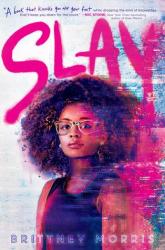
This book reminded me of Ready Player One in that it highlighted the potential for a better, or more chaotic, world of virtual reality. It was a cool concept and I liked the characters, but the plot was predictable and it just didn't speak to me. Slay is very real about the issues of racism within the online community, which is important to be educated on, but the serious topics mixed with an attempt at modern slang was odd. It is a nice book if you are bored, but not at the top of my list to reread.
Grade 12
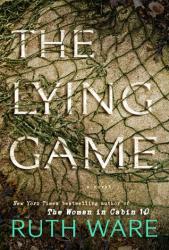
In this book, you follow four childhood friends (shown from the perspective of Isa Wilde) as the secrets of their past actions come back to haunt them.
I was intrigued by the premise of the story, but for the most part, the story was pretty boring and predictable. The concept of a lying game in the past was interesting and I was excited to see how would play into the story. The secret about what happened almost 20 years earlier seemed really overplayed to me. What actually happened didn't really seem as much of a big reveal as I thought it would be. The final twist at the end of the book wasn't anything special and I figured it out pretty quickly compared to other stories. The ending was anti-climactic; by the end of the story, I wasn't invested. The characters were fine: originally, they seemed relatable and human for the most part, but as the story progressed, I grew to dislike a couple of the main characters. Their actions seemed abnormal and irritating, and even within the context of the story, I still couldn't get over it. This could have been a better book, but the payoff wasn't there.
Reviewer's Grade: 11
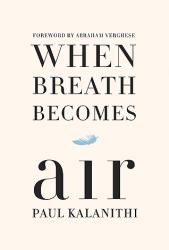
When Breath Becomes Air is an autobiographical, nonfiction, story of Paul Kalanithi, a man who has worked his whole life to pursue his dreams. Kalanithi is a top neurosurgeon-neuroscientist a couple years away from graduating medical school. Even before graduating, million dollar offers pour in for Kalanithi to head new, top research facilities. However, disaster strikes: lung cancer. Kalanithi talks about his progression from seeing people in the patient's chair to being the one in the chair. Throughout his journey, Kalanithi informs the reader of the life cycle, the importance of hard work, and most importantly, family and love.





 Ruth Holley Library will be temporarily closed for approximately one week starting Mon., Dec. 2 to complete roof repairs.
Ruth Holley Library will be temporarily closed for approximately one week starting Mon., Dec. 2 to complete roof repairs.